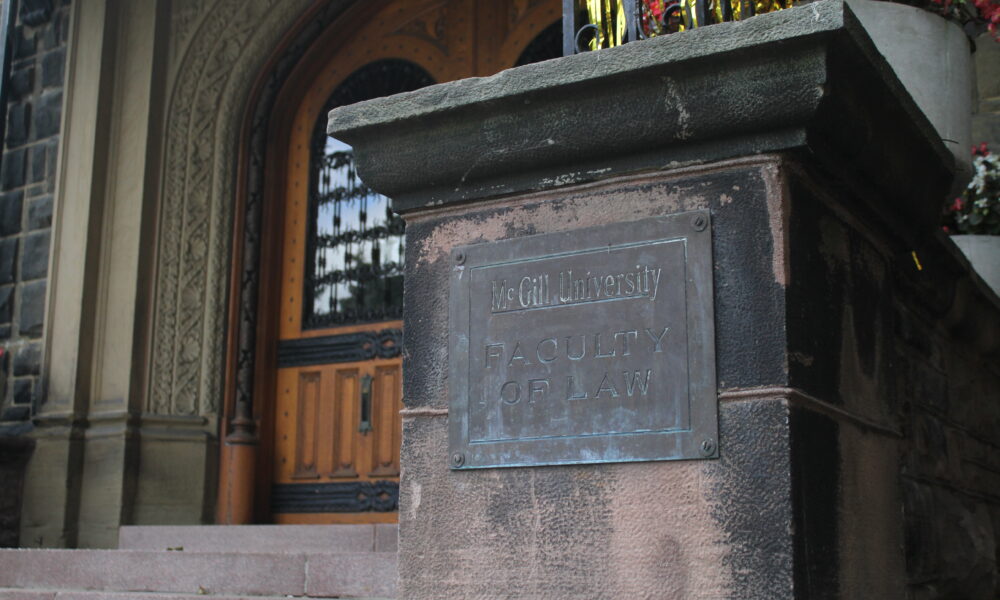The Association of McGill Professors of Law (AMPL) held a teach-in at Chancellor Day Hall on Sept. 25, featuring a talk by McGill Law alumna and lawyer Lex Gill. Gill’s talk, which focused on law and justice, was given in solidarity with AMPL’s efforts to protect their existence as a union and form a collective agreement with McGill amidst the university’s ongoing de-certification efforts. The event was one of several teach-ins the union has organized since it began striking intermittently on April 24.
Richard Janda, AMPL’s secretary, noted that the union has been holding teach-ins so students and professors can continue to learn in the absence of classes.
“We still care about teaching and we still care about turning even this experience into something people can learn from,” Janda said. “So when Lex offered to do a teach-in, we thought this would be inspirational for our students, but frankly, for us as well.”
According to Janda, McGill told arbitrator Maître Jean Allard that the fall Law term could be lost if a settlement isn’t reached by Oct. 1. Janda noted that the union does not “think that’s necessarily true,” but believes there will likely be a settlement from the university.
“The only way we’re going to save the semester is [if] the university talks to us now, and we see things that are moving in that direction. So that too is giving us a little bit of hope, not yet joy, but a little bit of hope, for sure,” Janda said.
Throughout the talk, Gill explored how her career as a litigator has shaped her view of the law and the ways it relates to justice. She explored the tension between using the structures of the law to support an argument, while recognizing the systemic flaws within them and the barriers they pose to achieving justice. For example, Gill noted that the law is an inherently conservative institution because it is built upon precedent, making change difficult. Furthermore, Gill argued that the law should be viewed as a practical tool rather than the starting point for change—change comes not only from the courtroom but from protests, art, and more.
Gill is a course lecturer and has taught classes in the Faculty of Law since 2020, but is not part of AMPL. Brette Thomson, 4L, took a class Gill taught earlier in her degree. Thomson told The Tribune that Gill’s lectures have been formative to her legal education and have pushed her to think about social justice outside of the legal framework.
“We’re all part of a community […] We’re all part of this movement to make McGill a more equitable and union-friendly place,” Thomson said. “I think that a lot of students think of themselves as customers of the university. And Lex would always encourage us not to think like that [and to instead] think of us as part of this broader project of justice, of unionization.”
Chris Irwin, 4L, echoed Thomson’s sentiment, noting that teach-ins help law students think beyond the legal arguments and understand what’s at stake for the law professors. Irwin also highlighted that the teach-ins are proof of AMPL’s efforts to teach and show up for students outside of the classroom.
“I just think these events where we get to directly hear from the union and where people can be exposed to what they’re fighting for are incredibly important,” Irwin said. “It’s not just some abstract fight that the profs are in or that they don’t care about students […] If you come out, it’s very clear that they’re still here to teach us […] even while they’re on strike.”
During the question-and-answer period after her talk, Gill underlined her support for AMPL. While acknowledging that some students may feel upset that their studies have not begun as normal this semester, Gill emphasized her belief that the law professors would win the judicial review McGill filed against them.
“There’s no doubt in my mind your professors are going to win,” Gill said. “They have excellent counsel. They’re radically organized [….] [And] they’re in an institution that is not equipped for the kind of persistence they’re bringing. So I’m not worried, and I’m not worried for any of you [law students].”







